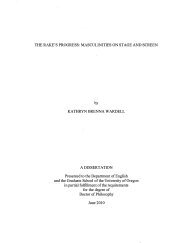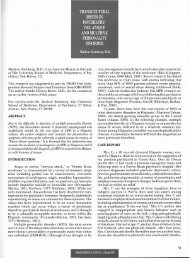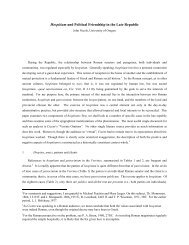~EGULAR SESSION - University of Oregon
~EGULAR SESSION - University of Oregon
~EGULAR SESSION - University of Oregon
You also want an ePaper? Increase the reach of your titles
YUMPU automatically turns print PDFs into web optimized ePapers that Google loves.
SOCIOLOGY 213<br />
(Soc 438) ; Political Sociology (Soc 465) ; Analytical Problems in Social Institutions<br />
(Soc 560) ; Values and Social Structure (Soc 561).<br />
General Theory. Development <strong>of</strong> Sociology (Soc 470) ; Analytical Problems<br />
in Sociological Theory (Soc 570) ; History <strong>of</strong> Social Thought (Soc 571) ; Development<br />
<strong>of</strong> American Sociology (Soc 572) ; Contemporary Sociology (Soc 573) ;<br />
Theory Building in Sociology (Soc 575).<br />
Graduate Work. The graduate program <strong>of</strong> the Department <strong>of</strong> Sociology,<br />
leading to the M.A., M.S., and Ph.D. degrees, is an intensive program designed<br />
to train pr<strong>of</strong>essional sociologists for teaching, research, and administrative posts<br />
in sociology and related fields. Most candidates for the Ph.D. degree first obtain<br />
a master's degree, but occasionally qualified students who have completed one<br />
year <strong>of</strong> work in residence are permitted to develop programs leading directly to<br />
the Ph.D.<br />
Early in their undergraduate years, students interested in graduate work in<br />
preparation for careers as pr<strong>of</strong>essional sociologists should consult an adviser in<br />
the department concerning the department's undergraduate preparatory program<br />
for research and teaching. Requirements include: (1) satisfaction <strong>of</strong> the<br />
language requirement for the B.A. degree; (2) a year sequence in mathematics;<br />
(3) at least one upper-division year sequence in two <strong>of</strong> the following fieldsanthropology,<br />
economics, political science, psychology.<br />
Students are not advised to seek an advanced degree in sociology unless they<br />
have achieved a grade-point average <strong>of</strong> 3.00 or better in their undergraduate<br />
work in the field; students whose undergraduate major has been in another field<br />
should have a grade-point average <strong>of</strong> 3.00 in all social science courses taken.<br />
The Department <strong>of</strong> Sociology <strong>of</strong>fers graduate study in four broad areas <strong>of</strong><br />
concentration: theory and methodology, social psychology, social structures and<br />
processes, and social institutions. Theory and methodology are combined to insure<br />
that no student may concentrate in one without preparation in the other.<br />
A core program is provided in each <strong>of</strong> these broad areas, which is required<br />
<strong>of</strong> every graduate student. The core courses with their prerequisites insure that<br />
every graduate student will have at least a minimum exposure to the subject<br />
matter <strong>of</strong> each <strong>of</strong> the general areas. For a second level <strong>of</strong> intensity <strong>of</strong> study, each<br />
student selects one <strong>of</strong> the general areas and is required to be broadly familiar<br />
with this area. For preparation in depth, the student, in consultation with his<br />
adviser, selects a field <strong>of</strong> specialization within the selected general area; in his<br />
specialized field he is expected to achieve a high level <strong>of</strong> competence through an<br />
intensive program <strong>of</strong> study culminating in the doctoral dissertation. Students are<br />
encouraged to select a second, supporting, area <strong>of</strong> specialization; this may be in a<br />
different general area <strong>of</strong> sociology or in another department.<br />
The graduate core courses in sociology are open only to students with full<br />
graduate status and with a substantial foundation in basic courses in the discipline.<br />
The department <strong>of</strong>fers two programs leading to the master's degree. One<br />
program, leading to the M.A. degree, is designed as a stepping stone to the Ph.D.<br />
degree. The other leads to a terminal master's degree for students preparing to<br />
enter pr<strong>of</strong>essional positions other than college or university teaching or research.<br />
No thesis is required in the latter program.<br />
Although the department accepts students who are interested only in the<br />
master's degree, its program is primarily intended for doctoral candidates. All<br />
students <strong>of</strong> good academic ability are encouraged to follow a course <strong>of</strong> study<br />
leading to the Ph.D. degree.<br />
Candidates for the doctor's degree must demonstrate clearly their basic and<br />
serious commitment to a pr<strong>of</strong>essional career in the social sciences, with particular<br />
emphasis on sociology. The department encourages interdisciplinary studies, and<br />
provides opportunity for the development <strong>of</strong> original programs <strong>of</strong> study designed<br />
to broaden the student's pr<strong>of</strong>essional preparation.
















